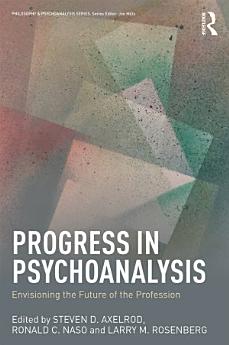Progress in Psychoanalysis: Envisioning the future of the profession
About this ebook
With contributors internationally recognized for their scholarship, Progress in Psychoanalysis: Envisioning the Future of the Profession offers both an analysis of how the culture of psychoanalysis has contributed to the profession’s current dilemmas and a description of the progressive trends taking form within the contemporary scene. Through a broad and rigorous examination of the psychoanalytic landscape, this book highlights the profession’s very real progress and describes a vision for its increased relevance. It shows how psychoanalysis can offer unparalleled value to the public.
Economic, political, and cultural factors have contributed to the marginalization of psychoanalysis over the past 30 years. But the profession’s internal rigidity, divisiveness, and strong adherence to tradition have left it unable to adapt to change and to innovate in the ways needed to remain relevant. The contributors to this book are prominent practitioners, theoreticians, researchers, and educators who offer cogent analysis of the culture of psychoanalysis and show how the profession’s foundation can be strengthened by building on the three pillars of openness, integration, and accountability.
This book is designed to help readers develop a clearer vision of a vital, engaged, contemporary psychoanalysis. The varied contributions to Progress in Psychoanalysis exemplify how the profession can change to better promote and build on the very real progress that is occurring in theory, research, training, and the many applications of psychoanalysis. They offer a roadmap for how the profession can begin to reclaim its leadership in wide-ranging efforts to explore the dynamics of mental life. Readers will come away with more confidence in psychoanalysis as an innovative enterprise and more excitement about how they can contribute to its growth.
About the author
Steven D. Axelrod, Ph.D., is an Adjunct Assistant Professor at the NYU Postdoctoral Program in Psychoanalysis and Psychotherapy, and a Senior Editor of Division/Review, a quarterly published by the APA’s Division of Psychoanalysis (Division 39). He is also a Principal of the Boswell Group, a psychodynamic management consulting group, and he maintains practices in psychoanalysis, psychotherapy, and organizational consulting in New York City.
Ronald C. Naso, Ph.D., ABPP., is a Board-Certified Psychoanalyst and Clinical Psychologist in independent practice in Stamford, CT. He is currently President of the American Board and Academy of Psychoanalysis. His book Hypocrisy Unmasked was published in 2010. In 2016, two additional books, Humanizing Evil and Ethics of Evil, co-edited with Jon Mills, were also published.
Larry M. Rosenberg, Ph.D., is the President of the Child and Adolescent Section of Division 39 of the APA and is a member of the board of the Section for Applied Clinical Psychoanalysis of the Division. He is a Co-Editor of the Child Section of the Psychodynamic Diagnostic Manual-2 and currently practices in Stamford, CT.





